The Samsung SSD 830 Review
by Anand Lal Shimpi on September 24, 2011 1:02 AM EST- Posted in
- SSDs
- Storage
- Samsung
- pm830
- Samsung SSD 830
Random Read/Write Speed
The four corners of SSD performance are as follows: random read, random write, sequential read and sequential write speed. Random accesses are generally small in size, while sequential accesses tend to be larger and thus we have the four Iometer tests we use in all of our reviews.
Our first test writes 4KB in a completely random pattern over an 8GB space of the drive to simulate the sort of random access that you'd see on an OS drive (even this is more stressful than a normal desktop user would see). I perform three concurrent IOs and run the test for 3 minutes. The results reported are in average MB/s over the entire time. We use both standard pseudo randomly generated data for each write as well as fully random data to show you both the maximum and minimum performance offered by SandForce based drives in these tests. The average performance of SF drives will likely be somewhere in between the two values for each drive you see in the graphs. For an understanding of why this matters, read our original SandForce article.
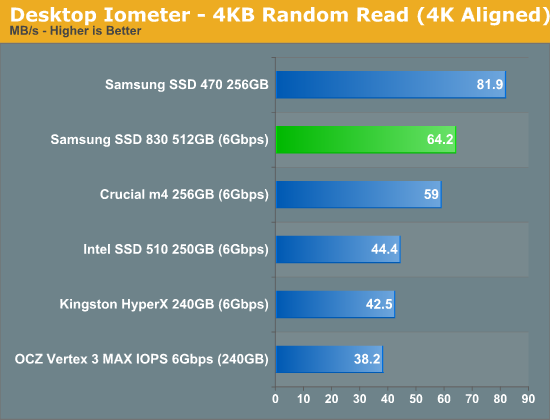
Just as we saw in Crucial's move to the m4 it looks like random read speed actually dropped a bit between the SSD 470 and 830. And just as we mentioned before, most desktop workloads don't demand super high 4KB random read performance so if this move was done to improve the 830's behavior elsewhere then it is a worthwhile tradeoff. Even with the drop however the 830 delivers the fastest 4KB random read performance of any high-end drive we've reviewed.
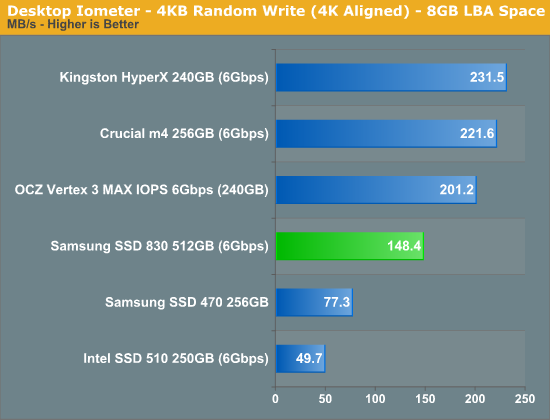
Random write performance has improved tremendously, although it's still noticeably slower than the SF-2281 drives and Crucial's m4. Similar to 4KB random read performance, there are diminishing returns beyond a certain level. Intel tends to have the right idea in how best to deal with random writes: work slower but clean up along the way, vs. write as fast as possible and rely on TRIM/idle garbage collection to improve performance later on. I've become wary whenever I see ultra high 4KB random write performance because it usually means that fragmentation can be a problem over time.
SandForce's numbers are high here because the workload is easily compressible, which is usually the case for desktop random writes as they tend to be table updates.
Many of you have asked for random write performance at higher queue depths. What I have below is our 4KB random write test performed at a queue depth of 32 instead of 3. While the vast majority of desktop usage models experience queue depths of 0 - 5, higher depths are possible in heavy I/O (and multi-user) workloads:
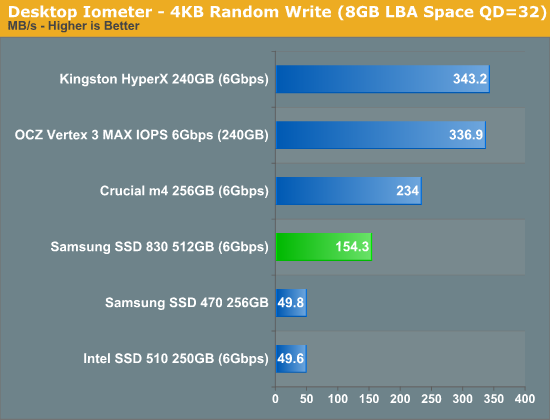
We don't see huge scaling with increasing queue depths from any of these drives really, with the exception of the SandForce solutions. Remember for the SF-2281 extra IO doesn't actually result in more writes to NAND, just a higher compression ratio which results in better performance with very little added work. I suspect SandForce's controllers could do very well in high load enterprise environments as a result. I've been working on an enterprise workload suite to figure that out...
Sequential Read/Write Speed
To measure sequential performance I ran a 1 minute long 128KB sequential test over the entire span of the drive at a queue depth of 1. The results reported are in average MB/s over the entire test length.
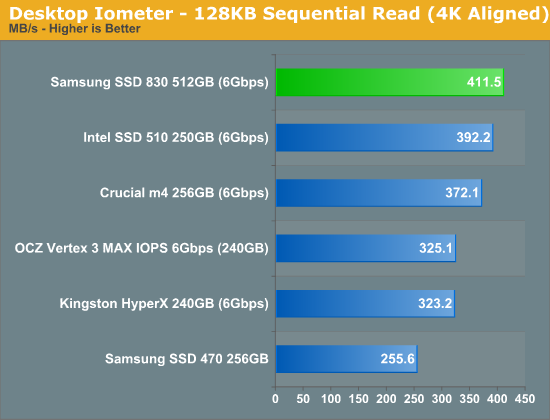
Although there are diminishing returns for ultra high random read/write operations on a desktop system, large sequential reads still scale quite well. If you do any amount of large file copying from your SSD to another SSD or file server you'll want to pay attention to these numbers here. Samsung manages to dethrone Intel at the top of our charts here with a very respectable 411.5MB/s.
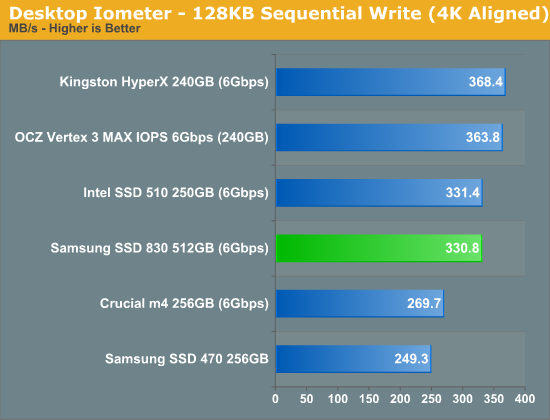
Sequential write speed is also still very important, again for those large file transfers. Despite the importance of random read/write IO the majority of desktop access patterns are still governed by sequential throughput. For an SSD to truly excel it needs good performance in all four of these categories. Thankfully for Samsung's sake, the SSD 830 delivers.










99 Comments
View All Comments
ruzveh - Wednesday, September 28, 2011 - link
hey anand, where are the other tests dude? Where is the boot time test, application open time, app loading time, etc.???abufrejoval - Wednesday, September 28, 2011 - link
This gap between ZEUS and FusionIO, SLC and embedded SAN SSDs on one end and those consumer SSDs on the other end has been narrowing, but it's incredible to see just how much vendors from all over the place fight to keep it from closing.I got enterprise workloads, which aren't all that high, very predictible, with highs and lows in line with typical OLTP front-end shopping patterns as well as some end-of-day processing.
The crux is the need for ultra high availability (or extremely short outages) and KISS answers that better than investing into premium SANs.
I want directly attached SSDs there, preferably in 2.5" form factor and in RAIDs for better capacity management and non-stop replacements.
20,ooo IOPS should do just fine, the real key is reliability and easy non-stop management. Daily overwrite is well below capacity so consumer SSDs should be fine. And I wouldn't mind replacing them after two years, if they'll reliably advise me of their imminent death weeks ahead.
I tried being clever and put Crucial m3 and OCZ Vertex 2 in a mirror set with an SSD aware LSI SAS RAID controller, to offset the risk of immature firmware/controller issues (the original plan was to use a SAN/SSD mirror, but resilvering would be too expensive). That didn't work out too well, because of these garbage collection issues (m3 drives were failed by the RAID controller, just because they took a little longer than their OCZ counterparts).
Of course we used synthetic tests first, "fio" to be exact and that just keeps those drives busy, busy, busy, quite beyond what actual workloads are likely to be. And in those cases the difference in garbage collection strategy caused real clashes, because the Crucial m3 took a finally took a long break when it had exhausted it's free space, while the OCZ stayed ready always, doing garbage collection on each and every write.
In real life, we might never see that problem, because actual IOPS during early mornings (after the day-end processing) might drop below the "magic" threshold" which allows those Crucials to do their garbage collection, but who knows what would happing during Christmas shopping season, when those unknown thresholds might just be exceeded a wee bit...
SSDs are not magnetic hard disks: They contain operating systems that need to be tuned just like your typical Oracle database. What's missing is interfaces which allow to read and set these well defined and published parameters in line with the use case you requrie.
In purely technological terms that should be easy enough. But every vendor, from database, via OS and SSD will want his cut for this reliability and speed, which is why this may not happen for another couple of years.
If only Samsung could make this strategy decision (early or late garbage collection) a user defined setting without price differentiation (enterprise vs. consumer) I'd be so happy!
Why do I think it won't happen?
gixxer - Monday, October 10, 2011 - link
Does anyone have a more concrete release date than "october"? I am starting a new build and if this gets released soo, it will definitly be a contender.DanSmith - Tuesday, December 6, 2011 - link
Hi Anand / All,Wonder if you if could shed any light on this drive supporting AES encryption using the "ATA password" BIOS options. Its been months now and this drive is on the market and there is sooo much conflicting info on the web about this drive supporting AES.
Even samsung themselves can give me a straight answer!!
Anyone who has one of these that can shed any light??
Cheers, Daniel
valhar2000 - Monday, December 26, 2011 - link
What's a TRIM pass? Do you have to run some sort of procedure every now and then to apply TRIM to an SSD? Isn't TRIM supposed to work in real time as files are deleted or moved?kazumoda - Wednesday, February 8, 2012 - link
I've been searching for a place to buy this Samsung PM830 but all I can find is the AM830. Can someone tell me if this is essentially the same thing or is it a vastly different product in terms of performance and reliability? Thanks. Is there any update on the performance of a smaller drive, in particular how does the 256gb version fare in terms of performance to the 512?datalaforge - Monday, February 27, 2012 - link
I recently installed one of these into my 2.26GHZ Unibody MBP. Its great with its 10 second boots and so on. The battery life is not great though. I think that it was better before. Is there anything that can be done?BRKHD1 - Sunday, September 30, 2012 - link
great review I love your site! I recently did a speed test of the samsung 830 on my youtube channel you can check it out here https://www.youtube.com/watch?v=gZJ-pPeE5lA Thanks again!BRKHD1 - Wednesday, November 28, 2012 - link
http://www.youtube.com/watch?v=gZJ-pPeE5lA&fea...